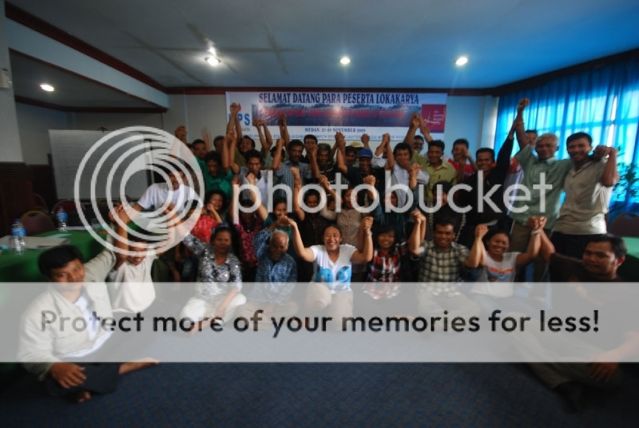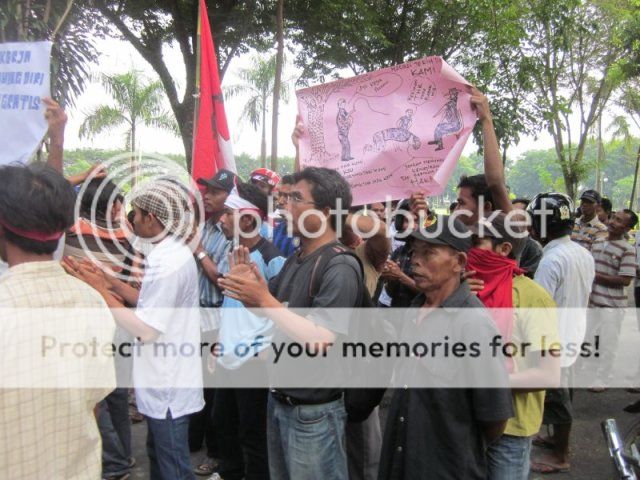Lugares de interés (POIs) del Mapa
0: Beyond Collective Bargaining :Case Study of Southeast Asia Region

Around 65 percent out of 280 million workforce in Southeast Asia region are vulnerably employed. Discussion on collective bargaining in this sub region involves other issues such as land grabbing, workers mobility and competition among workers for the livelihood territory especially in the urban area. Beyond collective bargaining suggests a process,beyond the regulatory framework, where workers reclaim their political space.
Full story: http://amrc.org.hk/node/1225
Más sobre Beyond Collective Bargaining :Case Study of Southeast Asia Region
1: Woman Workers in Service Industry in Cambodia

In Cambodia, service industry is one of the four main industries. Women employed in this industry makes up 25 percent of the total workforce. The work performed by women in the service industry is often considered as the work with "feminized" quality. Thus they are economically devalued and considered unskilled. In 2010, AMRC together with Cambodia Labour COnfederation (CLC) organized a survey involving 101 beer promotion and small restaurant workers in Phnom Penh, Poipet and Siam Reap. The output of the survey which emphasizes the organizing process is widely disseminated among groups in Cambodia
For further information on Working Poor Women Organizing in Cambodia,Philippine and Indonesia. please read the attached paper in this site.
Más sobre Woman Workers in Service Industry in Cambodia
2: Women as unpaid family workers

As in 2010, in Indonesia women make up 34.4 percent of own account workers and 33.6 percent of unpaid family workers (ILO 2010). AMRC has been working with KPS, a group which organizes palm oil plantation workers and landless peasants in North Sumatra Province in Indonesia to encourage the formation of cross sector alliance between landless peasant and casual workers. One of the major issue is women as unpaid family workers inside the plantation. Through several workshops, the women gained their confidence to recognize themselves as workers. Thus, they are entitled to workers' rights. They also determine to make themselves visible, capable of becoming agent of change.
Full story: http://amrc.org.hk/node/1147
Más sobre Women as unpaid family workers
3: Working Poor Women in Urban Slum Area in Philippines

In 2009, AMRC and Ecunemical Institution for Labour Education and Research (EILER) in Philippines organized a workshop involving groups organizing informal workers in urban and rural area. One of the issue discussed in the workshop was working poor women in slum area bearing dual burden of child rearing and earning livelihood. The workshop tried to address the best forms of organizing in dealing with that issue.
Full story http://amrc.org.hk/node/1147
Más sobre Working Poor Women in Urban Slum Area in Philippines
4: Organizing inside the Zone,Batam Free Trade Zone, Indonesia

Almost 80 percent of the workforce in Riau Island in Indonesia is contract workers who are recruited through recruitment agencies. Workers are required to pay the placement fee which ranges from 16 to 100 USD. Beside accelerating informalization further, the zone contributes to the creation of precarious society. Full story on organizing and political bargaining strategy inside the zone: http://amrc.org.hk/node/1236
Más sobre Organizing inside the Zone,Batam Free Trade Zone, Indonesia
5: Cross Sector Alliance, North Sumatra Province, Indonesia
 In North Sumatra Province, Indonesia,around 236,000 people work in the palm oil plantation estates. Around 80000palm oil plantation workers, 34 percent of the total workforce in the palm oilplantations are casual workers. Despite the fact that palm oil has been theprimary commodity generating the national income, the permanent plantationworkers only earn US$103/month which could only covers 60% of the basic needs.Meanwhile, the casual workers have to survive on US$1, 5 per day. The absenceof rights to freedom of association and other workers basic rights have leftplantation workers unprotected and vulnerable to various forms of rightsviolation.
In North Sumatra Province, Indonesia,around 236,000 people work in the palm oil plantation estates. Around 80000palm oil plantation workers, 34 percent of the total workforce in the palm oilplantations are casual workers. Despite the fact that palm oil has been theprimary commodity generating the national income, the permanent plantationworkers only earn US$103/month which could only covers 60% of the basic needs.Meanwhile, the casual workers have to survive on US$1, 5 per day. The absenceof rights to freedom of association and other workers basic rights have leftplantation workers unprotected and vulnerable to various forms of rightsviolation.
As thegovernment is determined to accelerate the growth of the industry,approximately around 400,100 hectares ofagriculture land and forests is converted into palm oil plantations in North Sumatra. The conversionof agriculture land is often executed in the aggressive and violent mannerstipulating prolonged social conflict between peasants and plantations. Thelandless peasants then are forced to survive by becoming casual workers in theplantations. The conversion of agriculture land has also threatened thesustainability of food sovereignty as rice product in North Sumatra province hasdecreased by around 20% per year.
Following is the documentation of AMRC work with the local group, KPS from 2009-11 to encourage the formation of cross sector alliance between landless peasants and casual workers
Más sobre Cross Sector Alliance, North Sumatra Province, Indonesia
6: Waste Pickers Organizing in Central Java Province Indonesia

In Indonesia, by estimation, 92 percent of the 114 million workforce is engaged to the informal employment. The following case study focuses on waste pickers organizing in Solo, Central Java Province, Indonesia. It captures the struggle of the waste pickers against forced eviction. The groups managed to gain a political recognition after series of protest and negotiation before the local authorities.
Full story : the attached booklet of New Ways of Organizing pp 7-11 http://amrc.org.hk/node/1170
Más sobre Waste Pickers Organizing in Central Java Province Indonesia
7: Informal Workers Organizing in Cambodia

In Cambodia, almost 80 percent of the total workforce is engaged to the informal work. AMRC started working with Cambodia Labour Confederation (CLC) in 2009 by organizing a workshop to conceptualize and map out the informalization in Cambodia. Some case studies such as tuk-tuk drivers organizing and beer promotion workers organizing set up an example of the process how collective bargaining power is gradually constituted.
Full story: http://regionalinitiatives.wordpress.com/2012/02/19/organizing-informal-workers-in-cambodia/
Más sobre Informal Workers Organizing in Cambodia
8: Organizing Contract Workers

In 2010, AMRC working with partner, Confederation of Indonesia Union Alliance (KASBI), organized a workshop in West Java Province to discuss process of organizing contract workers. The workshop mainly discussed best forms of organization of contract workers, building a solidarity between permanent and contract workers and process of identifying bargaining target. Full story: http://regionalinitiatives.wordpress.com/2012/02/10/designing-manual-for-organizing-contract-workers/
Más sobre Organizing Contract Workers
9: Workshop on Cross Sector Alliance

Indonesia has been the world largest palm oil producer in the world. With total 7.3 million ha palm oil plantation—around 77% is concentrated in Sumatra island—absorbing around 2.5 million workforces, Indonesia’s annual output is around 20 million tons. The government is planning to accelerate the growth in this industry by giving licenses to investors to open additionally two million hectares of plantations. The industry so far has absorbed around 4 million workforces.
On 28-29 November 2009, AMRC and partner organized a workshop to discuss the impact of palm oil plantation expansion on the livelihood of the community. The workshop was also to build a solidarity between peasants and workers in a form of cross sector alliance.
Full story: http://amrc.org.hk/node/1253 The report attached at that site contain the mapping of impacts of plantation expansion on the community. peasants and workers.
Más sobre Workshop on Cross Sector Alliance
10: Regional Meeting Proceeding on Informal Workers Organizing and Collective Bargaining

This regional meeting concluded the three-year AMRC project, New Ways of Organizing. This meeting was aimed at bringing groups in Asia to exchange their experiences and skills in solving the problems and barriers encountered in the organizing and collective bargaining.
The groups from Indonesia, Cambodia and Philippines who had involved in the three year process led the discussion session by explaining the power mapping method.Full report :http://amrc.org.hk/node/1254
Más sobre Regional Meeting Proceeding on Informal Workers Organizing and Collective Bargaining
11: Reflection group meeting on informalization

The following report is a proceeding of 2010 AMRC workshop report which was organized in Hong Kong on May 28-29,2010. The meeting involved groups from 9 countries in Asia to discuss forms of informal workers organizations. The report contains tables of various organizing strategies, collective bargaining and local political background. Full report : http://amrc.org.hk/node/994
Más sobre Reflection group meeting on informalization
12: Designing Training Manual for Contract Workers

Following is the workshop report which was organized in 2010. The workshop brought various workers groups to structure their organizing experiences into organizing manual. During the workshop, the groups elaborate process of organizing contract workers in various industrial zones. Full report can be downloaded here: http://amrc.org.hk/node/1255
Más sobre Designing Training Manual for Contract Workers
13: Designing Training Manual for Informal Economy Workers

In 2010, AMRC co-organized a small workshop with Confederation of Indonesia Union Alliance (KASBI) in Central Java province, Indonesia. The workshop involved local groups that organized peasants, waste pickers and fishermen. The report of the workshop reflects a process wherein the groups shared their experiences in dealing with various issues such as land grabbing and privatization of coastal area.
All experiences were structured and to be used as a basis to design a training manual.
In the same year, the local organizations managed to publish the manual in the local language.
Full story : http://regionalinitiatives.wordpress.com/2012/02/17/indonesia-organizing-informal-workers-in-urban-area/
Más sobre Designing Training Manual for Informal Economy Workers
14: Plantation Casual Workers Rally for Their Rights

On August 14, 2012, palm oil casual workers in North Sumatra Indonesia, members of Indonesia Plantation Union (SBPI) rallied and pushed for negotiation with local authorities to demand their basic rights as workers. Full story: https://regionalinitiatives.wordpress.com/2012/08/17/hundreds-of-casual-workers-of-langkat-nusantara-kepong-company-rally-for-their-rights/
Más sobre Plantation Casual Workers Rally for Their Rights